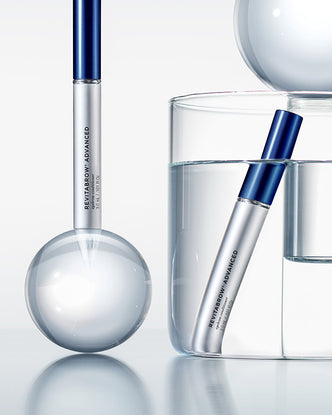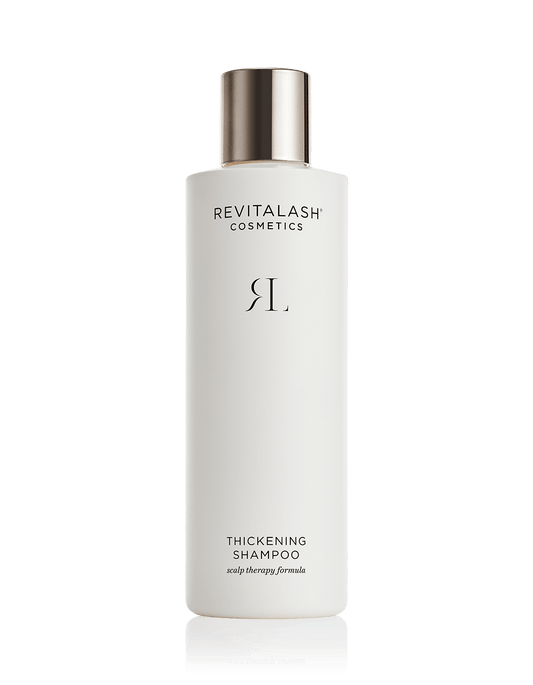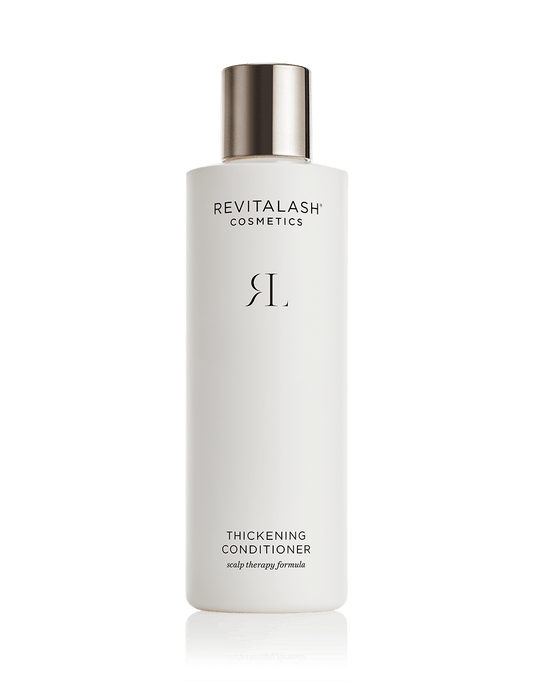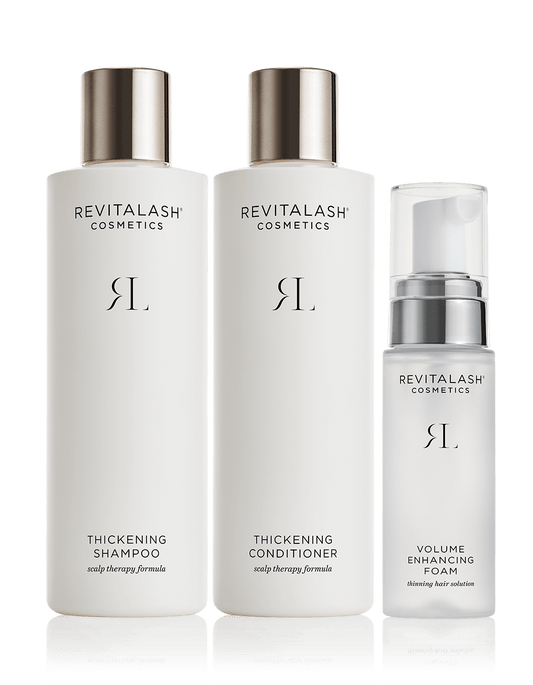
What Happens to Your Hair as You Age
Aging is a beautiful thing. As we age, we experience many changes that enrich our lives. We gain wisdom, confidence, and new experiences…the list goes on. But aging also brings some changes that are not as desirable, like changes to our bodies, including our hair.
Like our skin, muscles, and bones, our hair changes as we age. Knowing what to expect can help you adapt your haircare routine—and keep your hair healthy at any age. But what, exactly, does the hair aging process look like and how does hair change as we age?
And what are the secrets for managing aging hair—and maintaining hair vitality well into your golden years? Let’s take a look at everything you need to know about hair health and aging—as well as age-related hair care tips to support more beautiful hair:
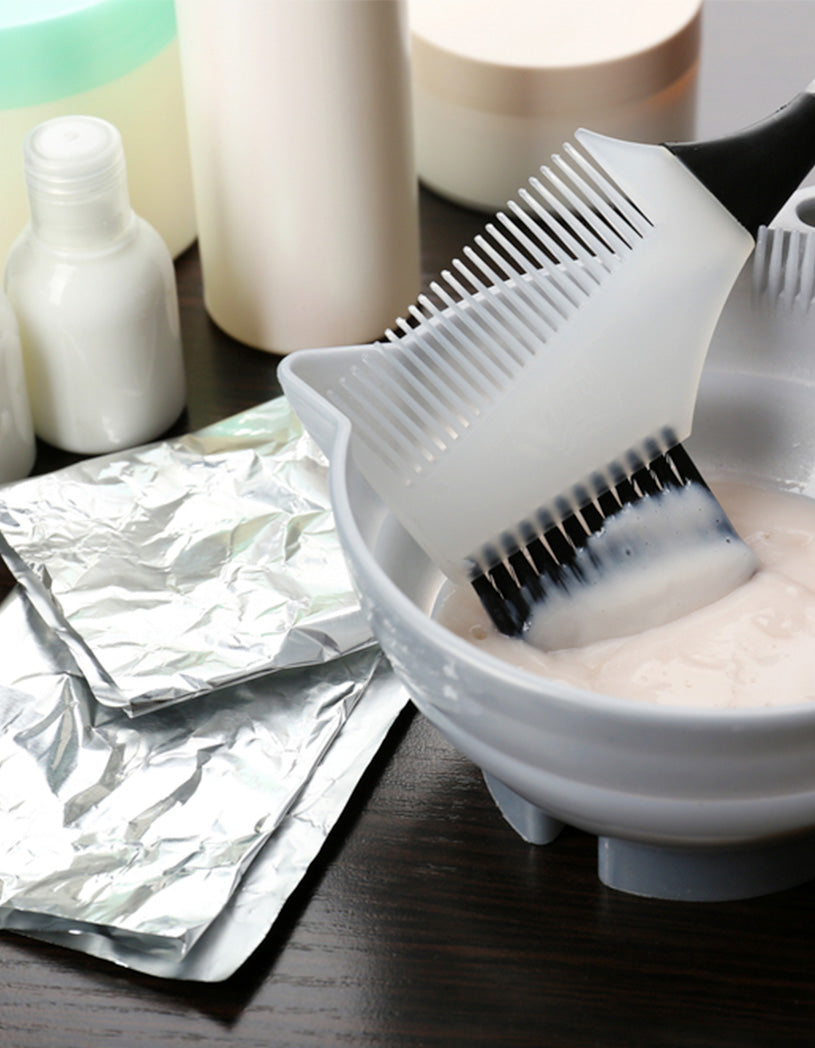
What are the common aging hair changes?
Before we jump into how to treat aging hair changes, let’s touch on what those changes actually are.
There are a number of ways in which hair changes as we get older, including:
Hair texture changes
One of the ways that hair may change as we get older is the actual texture of the hair.
The more you age, the more your hair is exposed to factors that could cause damage. These can include UV rays, chemicals from hair products and/or treatments, or weather/climate-related factors (like wind, cold, humidity, and dryness). The more you’re exposed to those things, the more likely you are to suffer damage that could change the texture of your hair.
Not only that, but sebaceous glands which produce oil in the scalp become less active over time. This change can make hair drier, more brittle, and less shiny. It also makes hair more prone to damage. This is why hair breakage and aging often go hand in hand.
Hair density and diameter changes
Another way hair changes as we age is by decreasing in density.
Shedding hair is totally normal; our bodies are constantly shedding old hair and growing new hair. In fact, according to the American Academy of Dermatology Association (AADA), it’s normal to lose anywhere between 50 and 100 hairs per day.
But as we age, that process can change. Our bodies will continue shedding hair. However, as our scalps age, some hair follicles may stop growing new hair. This can lead to less hair density. (For example, you might find that your part is wider than it used to be—or your hairline might recede a bit.)
In addition to reduced density, follicles may gradually shrink, resulting in finer strands of hair. This change in hair diameter can make hair more prone to damage. Visually, it can also appear as if there is less hair, especially when hair density decreases simultaneously. For example, if you braid your hair, you might notice that it looks and feels less full than you’re used to.
This one-two punch is essentially what we know as hair thinning—and hair thinning with age begins sooner than you’d think. Research shows that hair density is highest in the late 20s. After that, it begins to decline. Hair diameter increases until age 45, then it also starts to decline.
Want the perfect products for aging hair? Try our Thickening Shampoo, Thickening Conditioner, and Volume Enhancing Foam
As mentioned, using the right products is key to ensuring that hair looks as healthy, shiny, and full as possible as we age. If you want products that help aging hair and enhance your natural beauty, try RevitaLash® Cosmetics Thickening Shampoo, Thickening Conditioner, and Volume Enhancing Foam.
These three products work together to leave aging hair looking and feeling its best. Each of these products is formulated to strengthen and support the hair in different ways, including:

Thickening Shampoo
This plant-based shampoo is free of sulfate detergents. It’s also rich in therapeutic ingredients to support optimum scalp health, fortify the hair cuticle, and work to improve hair shaft thickness. It contains loquat leaf to help with thinning hair, and biotin to support hair volume and strength. Panthenol helps hydrate hair and improve shine. Willow bark gently exfoliates the scalp.
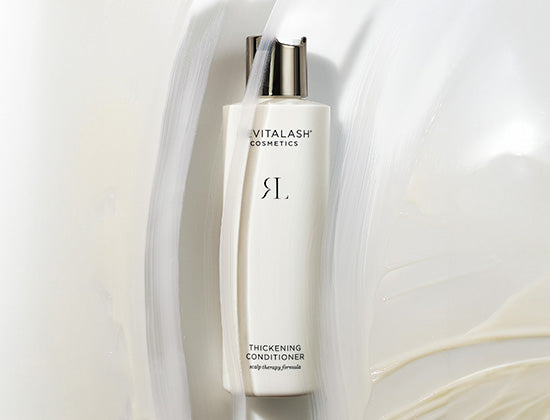
Thickening Conditioner
This conditioner is also rich in therapeutic ingredients that hydrate and replenish the hair. Specifically formulated for fine, thinning hair, it features biotin, loquat leaf, and flax protein to nourish and protect hair. It also includes green tea and ginseng, which offer powerful antioxidants to protect the hair and scalp.
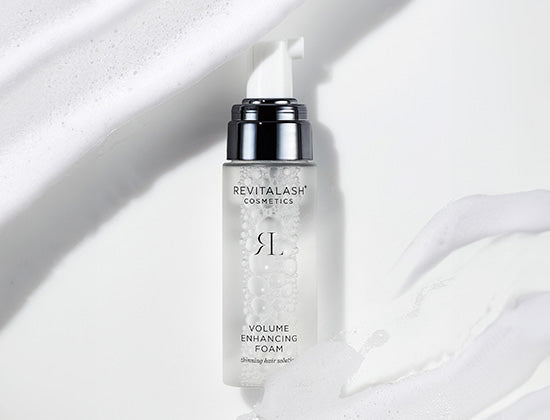
Volume Enhancing Foam
Our physician-developed formula adds body and boosts hair’s vitality. This foam contains our exclusive BioPeptin Complex®, which conditions, strengthens, and softens hair. It also helps prevent breakage and brittleness.
When combined, these three products help hair transform to feel fuller, look thicker, and perform better—combatting the signs of aging in the process.

Hair color changes
As everyone knows, as we grow older, we also grow grayer (or whiter, depending on your hair) – and there’s a reason for that!
As we get older, pigment cells in hair follicles slowly decrease. This leads to less melanin production. As a result, hair loses its natural color and turns gray or white.
Some people go gray early, but most start to gray in their mid-30s to mid-40s. By age 50, half of all people have noticeable gray hair.
Why does your hair change and thin as you age?
Clearly, our hair goes through a lot of changes as we age—including thinning. But what is causing those changes?
Some of the factors that cause aging hair issues include:
- Environmental factors. As mentioned, environmental factors can cause problems. These include UV exposure, chemicals from hair products, and weather exposure (including heat, humidity, wind, and dryness). And as we age—and we have more exposure to those environmental factors—those issues can get worse.
- Hormonal effects on hair. Fluctuations in hormone levels, particularly during menopause in women, can contribute to hair thinning. Hormonal imbalances affect the hair growth cycle, leading to shorter growth phases and longer resting phases.
- Genetic predisposition. Genetics play a significant role in determining hair loss patterns. Medical conditions such as androgenetic alopecia (female pattern hair loss), commonly known as male or female pattern baldness, is often hereditary and results in progressive hair thinning.
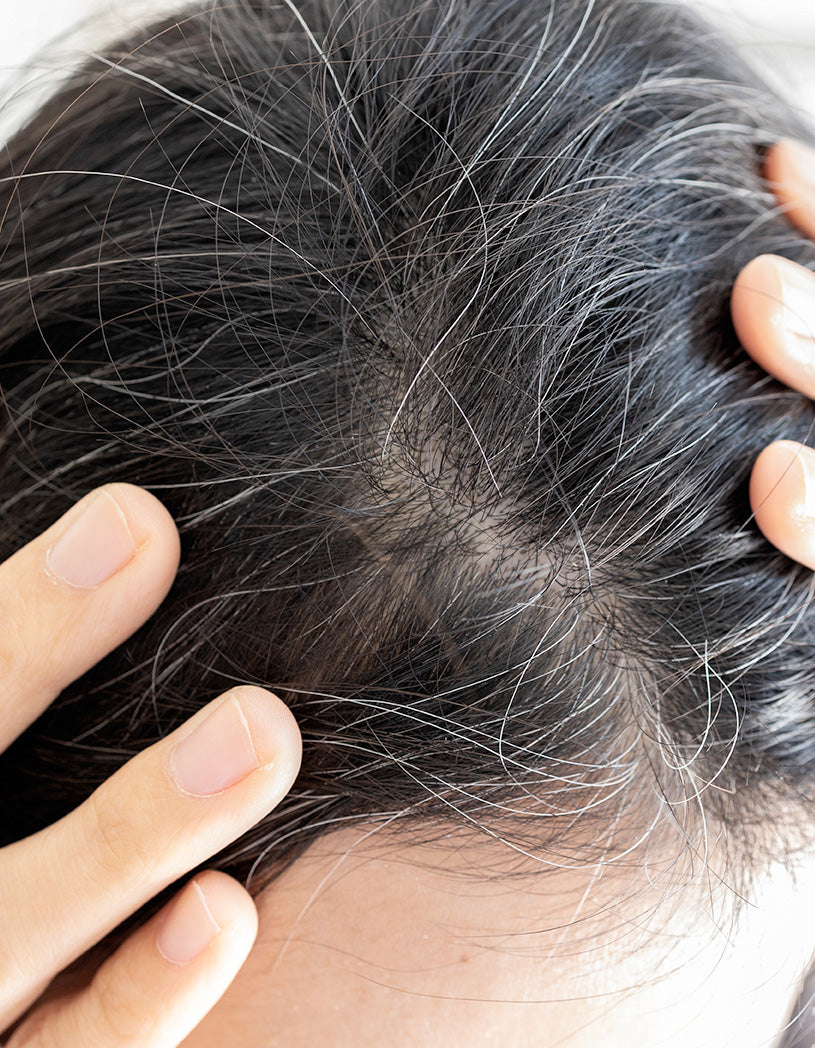
Tips to support healthy hair as you age
Age-related hair changes are inevitable. But that doesn’t mean there aren’t steps you can take to keep your hair looking shiny, healthy, and strong as you age!
Here are a few tips to support healthy hair as you move through the aging process:
- Wash less frequently. Frequent shampooing can strip your hair of its natural oils, leading to dryness and damage. Opt for shampoos free of sulfate detergents (which can be drying) and limit washing your hair to 2–3 times per week.
- Choose the right shampoo and conditioner. Choose shampoos and conditioners that improve scalp health. They should also nourish your hair with moisturizing ingredients. Look for products that make your hair look fuller.
- Try a hair volumizer. If your hair is fine or thinning, hair volumizing products can help you achieve more volume.
- Opt for anti-aging hair treatments. In addition to day-to-day products, part of effective hair care includes more potent, targeted hair treatments. Choose treatments that help to hydrate, strengthen, and restore balance to the hair—like hydrating hair masks.
- Eat a healthy, protein-rich diet. A well-balanced diet rich in protein, vitamins, and minerals is crucial for healthy hair. Include foods such as lean meats, fish, eggs, fruits, vegetables, and nuts in your daily meals.
- Avoid too much heat. Because the hair is more delicate as you age, it’s important to protect it from heat damage. Try to limit heat styling. When blow drying, using flat iron or straightener, set it to a low temperature. Always apply heat protectant before styling.
Fight age-related hair issues with the right products and routine
Aging hair is a natural part of life's journey. By understanding how hair changes and what it needs, we can create a routine that supports our hair at every age. This helps us fight age-related hair issues like thinning and texture changes—and allows us to embrace our beauty at any (and every!) age.
SHOP THE PRODUCTS
Scalp Therapy Formula
Regular price $38Regular priceSale price $38Unit price / perScalp Therapy Formula
Regular price $39Regular priceSale price $39Unit price / perThinning Hair Solution
Regular price $152Regular priceSale price $152Unit price / perBest Value Set
Regular price $186Regular priceSale price $186Unit price / per
Related Posts
Say Goodbye to Flat, Limp Hair
Summer Can Leave Hair Damaged. These Tips Can Help
A Healthy Scalp Is Vital for Strong, Shiny Hair
The Real Reason Your Hair Is Damaged (& What to Do About It)
Your bag is empty
Choose Your Gift
Women's Cancer Impact
Donate today to City of Hope to support life saving research.
Thank you for your donation to City of Hope
Subtotal
$0
- Choosing a selection results in a full page refresh.
- Opens in a new window.

